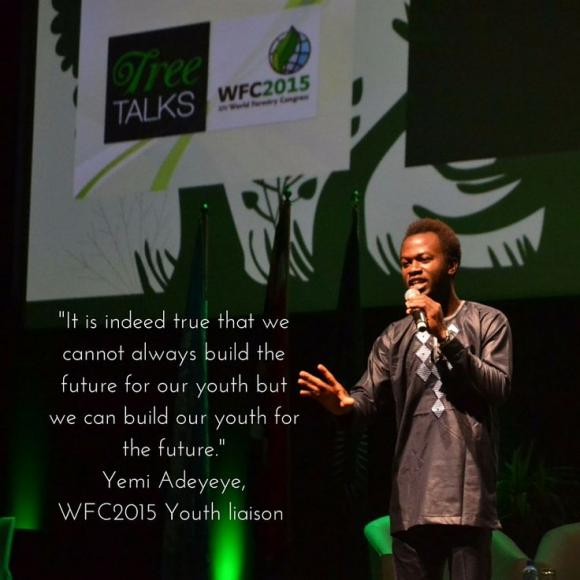-
About
- Our Work
- Get Involved
- Stay Updated

Youth’s engagement was vibrant both physically and online during this year's World Forestry Congress. As young people, we wanted to generate strong youth’s discussions, content and outcome statements; we had paved the way for that by proposing 15 youth cross-cutting aspects to think about throughout the World Forestry Congress. Read: mainstreaming Youth for sustainable forest and people’s futures: 15 youth cross-cutting focuses at the World Forestry Congress
The How of Youth involvement in World Forestry Congress 2015
Unlike other previous congresses, in the WFC 2015, young people were actively involved in both the discussions and outcomes formulation of most of the sessions .This was through taking lead roles from panelists to technical reporters. In addition, there was a dedicated workshop to determine a common youth vision and a series of commitments such as a youth session where young people showcased their work, inspired and asked for support based on their current experience in the sector.
During the congress proceedings, it was stressed that young people are already key players in the management of forests and they thus play a critical role in ensuring food security and nutrition, healthy local livelihoods responding to climate change and meeting the SDGs. Also,the urgent need for effective investments with adequate financial resources was expressed. This includes investment in capacity development, notably at the community-level, investment in forest education and in creating employment opportunities especially for young people.
Also, the World Forestry Congress was keen on hearing from the youth about the future of forests they want. As such, the youth delegation came up with some specific vision highlighting their own commitment for change.Youths commitment to the future of forests they want
WFC2015 Young people collectively envision forests as resources that should be managed in ways that enable continuous provision for the needs of current and future generations. They want forests managed based on mutli-stakeholder engagement and acceptance. In this way,the forests would serve people by providing food, water, shelter, energy and employment. In addition, forests should be maintained as a spring for inspiration, spirituality and culture and as a result, protect nature, the climate and ultimately sustain life.
Young people present expressed that they commit to framing actionable policies at all levels, implementing policies at the local, national and global level, actively engaging in their communities, breaking barriers and contributing to integrated solutions across sectors, regions and generations. They recognize that partnerships and alliances for a green economy can only result to change by respecting different perspectives, beliefs and cultures and bringing people together rather than seeking to tear them apart.
They urged the stakeholders in the forestry sector to provide investment in innovative education for developing skills including social and intercultural awareness, communication, practical capacity building, critical thinking, and platforms for meaningful engagement of young people as well as social equity in local/national/global decision making processes. Have a look at the Report of the plenary and other sessions, including the youth sessions.Youth's Tree Talks
Get inspired by these three inspiring youth’s tree talks [videos]:
- Yemi Adeyeye, during the Inspiring solutions for a sustainable future session:
- Sekar Ayu Woro Yunita, during the youth session
- Charles Batte, during the youth session
Youth Blog posts
Young people performed well as social reporters and some others who were not able to attend took the opportunity of online communications to take part in the discussions and have their say. Here is a selection of some youth’s blog posts. Read all blogposts from or about the youth at WFC2015.
- Young but not limited by age
- The Restoration Generation
- Promoting Youth Perspectives for Sustainable Living
- Nurturing the next generation of foresters
Youth Forests Video
The large youth team, participating in the World Forestry Congress, organized a spontaneous flash mob at the conference. As it turned out, the flash mob was one more way they attracted the attention of both media and participants hence stressing the importance of youth involvement, both in conferences like #Forests2015, but also in the overall future of forestry, and sustainable management of natural resources.
Stay tuned for more information and congress outcomes.The World Forestry Congress' youth program was supported by three main youth-led organisations and networks: IFSA - internationational forestry students association, YPARD - young professionals for agricultural development and IAAS - international agricultural association of students.
About the author
Related Posts
Comments
No comments made yet. Be the first to submit a commentBy accepting you will be accessing a service provided by a third-party external to https://archive.ypard.net/
Get in touch
Email: [email protected]
YPARD Global Coordination UnitHosted by AGRIDEA and the Czech University of Life Sciences Prague
Lausanne, Switzerland and Prague, Czech Republic - Our Work

